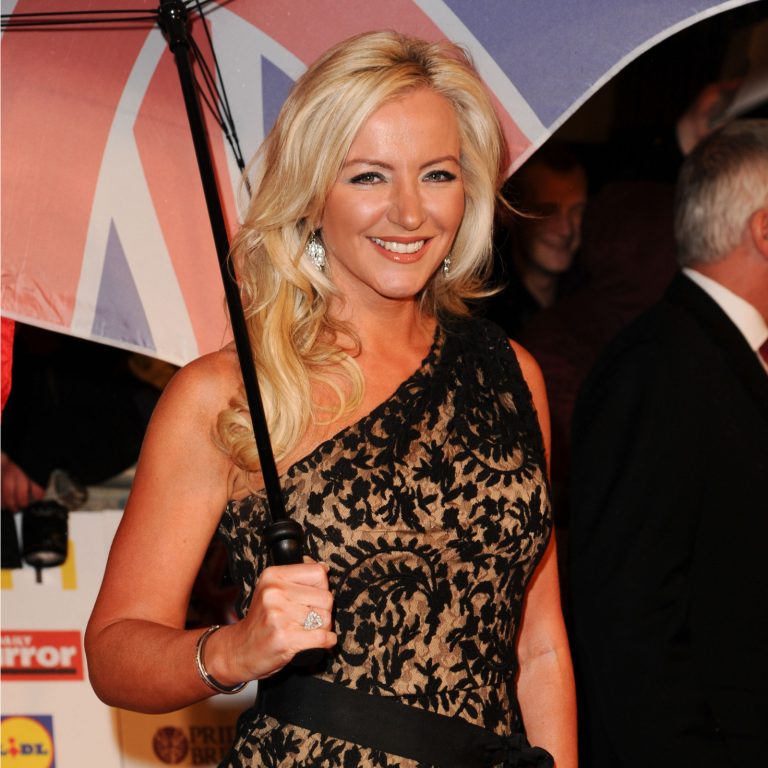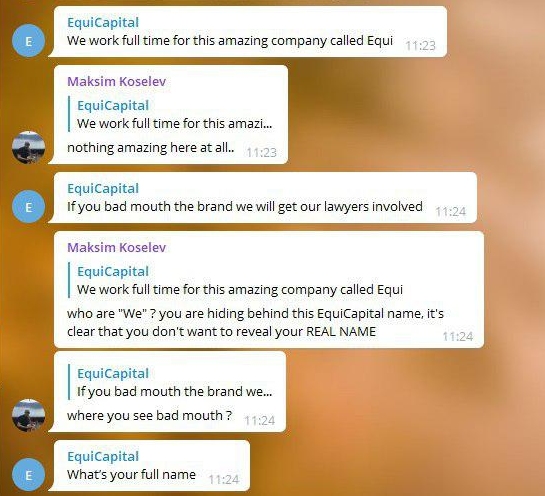Latest news about Bitcoin and all cryptocurrencies. Your daily crypto news habit.

Equi Capital’s ICO has ended in acrimony, with bounty hunters claiming to have been offered a pittance of what they were promised. The project is led by Baroness Michelle Mone, who describes herself as “one of the United Kingdom’s most celebrated entrepreneurs”. The fallout sheds light on the plight of low income workers who toil on behalf of cryptocurrency arrivistes such as Equi Capital’s celebrity co-founder.
Also read: Thanks to Mainstream Media the Public Clueless About Cryptocurrency
Lady Mone, Equi Capital, and the ICO That Never Was
Lady Mone of Mayfair OBE, as she likes to be known, is a familiar face in the UK, popping up at black-tie events and charging up to $30,000 for public speaking. (OBE stands for Officer of the Most Excellent Order of the British Empire, an award she was given by then-Prime Minister David Cameron). Michelle Mone is a controversial figure best known for founding the Ultimo lingerie firm before rising to become a “global entrepreneur” whose “impressive portfolio has led to Lady Mone being firmly cemented as one of the world’s most in-demand public speakers”. Wikipedia states that “Mone ranks among the UK’s most successful businesswomen and her designs can still be found in department stores worldwide,” before finishing with “[citation needed]”.
 Shortly after launching her Equi Capital ICO this year, Lady Mone proclaimed to be “one of the biggest experts in Cryptocurrency & Blockchain”, despite having first tweeted about cryptocurrency only five months earlier. Aided by her peerage granting lifetime membership of the House of Lords (the UK’s upper parliament), billionaire boyfriend, and retinue of highly paid lawyers and publicists, Lady Mone was confident that Equi Capital would be a success. From the start, however, it was unclear who the prime beneficiary of the project was meant to be: the tech startups Equi Capital would be investing in, token-holders, women, or Michelle Mone and her Equi colleagues, as the message seemed to be constantly shifting.
Shortly after launching her Equi Capital ICO this year, Lady Mone proclaimed to be “one of the biggest experts in Cryptocurrency & Blockchain”, despite having first tweeted about cryptocurrency only five months earlier. Aided by her peerage granting lifetime membership of the House of Lords (the UK’s upper parliament), billionaire boyfriend, and retinue of highly paid lawyers and publicists, Lady Mone was confident that Equi Capital would be a success. From the start, however, it was unclear who the prime beneficiary of the project was meant to be: the tech startups Equi Capital would be investing in, token-holders, women, or Michelle Mone and her Equi colleagues, as the message seemed to be constantly shifting.
One group that Equi Capital wasn’t designed for was low income workers in countries such as Russia, India, and Indonesia, but over 1,000 of these agreed to promote the ICO nevertheless in exchange for tokens. Shortly thereafter, however, things began to go awry, both for the bounty hunters and for Equi Capital.
The facts of the case run as follows:
- February 6, 2018: Baroness Mone and billionaire boyfriend Doug Barrowman announce Equi Capital, a venture capital ICO to support startups
- MSM, UK press especially, unquestioningly publishes Lady Mone’s bold claims, including the assertion that Equi will “encourage women to invest in tech”
- February 9: News.Bitcoin.com takes a dissenting view, arguing “Whatever her ICO may be, it has nothing to do with helping women”
- March 1: Equi Capital launches its six-week ICO, seeking to raise $75 million
- March 30: Having raised less than 10% of its target, Equi extends its ICO for another six weeks
- May 6: The community management company hired by Equi Capital to oversee its bounty campaign severs all ties, citing “irreconcilable differences”
- May 24: Equi launches a new bounty campaign, promising participants 2% of all tokens, valued at $2.5m
- June 30: The extended Equi ICO closes, having failed to meet its target
- July: ICO investors are refunded
- August: Acrimony breaks out as bounty hunters are informed they’ll be offered around $5 each for months of work – approximately 2% of the original total promised
Mutiny on the Bounty
As alternative UK media outlet Wings reported this week, “Bounty hunters are effectively unpaid marketers, often from developing countries, who help to raise awareness online, particularly among the cryptocurrency community. In return for their efforts, they are remunerated in the form of tokens. Some of the workers posted adverts on social media platforms and others created YouTube videos, while yet more translated Equi marketing materials.”
The global workforce…were left stunned at the outcome of a project led by a woman who some – perhaps not grasping the complexities of the British honours system – had mistakenly believed to be a member of the Royal Family. When Baroness Mone announced the launch of Equi Capital, a series of slick and professional promotional videos had done nothing to dispel the notion…in one YouTube interview she looked directly into the camera and introduced herself saying, “My name is Baroness Mone of Mayfair… I was made a Baroness by Her Majesty the Queen.”
Equi Capital’s 1,000+ bounty hunters, having been offered 2% of funds, would have been entitled to $140,000 of the ~$7 million that was ultimately raised. Instead, they were offered just $5,500 in total, which was eventually rounded up to $10,000. (This equates to approximately $10 per head, or $2 for every month spent promoting the aborted project.) Bounty hunters were quick to make their feelings known on social media:
“Our Founder is a Baroness and She Doesn’t Lie”
 On Telegram, meanwhile, things were turning ugly. Any sign of dissent in the Equi Telegram channel resulted in chats being deleted and protesters banned. The account admin also deleted a separate Telegram group for bounty participants, and then entered a spin-off channel set up by disgruntled bounty hunters to berate them. “Our founder is a Baroness,” wrote the Equi Capital admin “and I can assure you she doesn’t lie”. And: “Our lawyers will show you who is legally wrong here. It’s [sic] certainly isn’t our high profile entrepreneurs”.
On Telegram, meanwhile, things were turning ugly. Any sign of dissent in the Equi Telegram channel resulted in chats being deleted and protesters banned. The account admin also deleted a separate Telegram group for bounty participants, and then entered a spin-off channel set up by disgruntled bounty hunters to berate them. “Our founder is a Baroness,” wrote the Equi Capital admin “and I can assure you she doesn’t lie”. And: “Our lawyers will show you who is legally wrong here. It’s [sic] certainly isn’t our high profile entrepreneurs”.
On the Bitcointalk forum, bounty hunters created a thread to fight for what they believed was rightfully theirs. Meanwhile, Baroness Mone and her team jetted off to Silicon Valley to prepare a relaunch of Equi Capital, this time operating under the name of Equi Global. In her wake, she left a mass of seething bounty hunters, claiming to have been used as free labor and then jettisoned when it became evident the ICO would flop.
Power, Prestige and the Press
News.Bitcoin.com reached out to Equi Capital three days ago ago seeking comment for this story but failed to receive a response. We then contacted the PR agency that represents Lady Mone. Despite repeated requests for a statement from Equi Capital or its co-founder, the agency refused, asserting that any attempts to document this story would be “highly defamatory, libellous and actionable”.
 Michelle Mone, depicted on Equi.Capital
Michelle Mone, depicted on Equi.Capital
UK media outlet Wings concludes: “Doug Barrowman described Equi Capital as a way to “give everyone an opportunity to play in my world”. Those who still await any recompense for their time and effort may wish they hadn’t played at all.” In a previous interview, the Equi founder opined, “So many of these ICOs have no purpose…You basically buy a token, or a coin if it’s a brand new currency, which actually has no real value at the moment in the real world.”
From a legal perspective, Equi Capital is likely to be on firm ground in dismissing its bounty hunters with a fraction of their dues. From a moral one, however, there would appear to be a prima facie case. “We’re not in it for money,” Baroness Mone told the Sunday Times back in March. “We’re doing this because we’re passionate about the cryptocurrency community.” Upon relaunching as Equi Global, the Baroness may be forced to proceed without the support of the cryptocurrency community and its army of bounty hunters.
Do you think ICOs should be legally bound to keep their promises to bounty hunters? Let us know in the comments section below.
Images courtesy of Shutterstock, Telegram, Equi.Capital, and Twitter.
Need to calculate your bitcoin holdings? Check our tools section.
Disclaimer
The views and opinions expressed in this article are solely those of the authors and do not reflect the views of Bitcoin Insider. Every investment and trading move involves risk - this is especially true for cryptocurrencies given their volatility. We strongly advise our readers to conduct their own research when making a decision.

